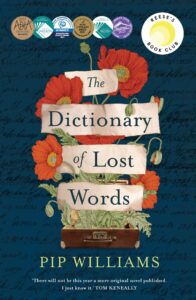 The Dictionary of Lost Words by Pip Williams
The Dictionary of Lost Words by Pip Williams Published by Affirm Press on 2020
Genres: Historical Fiction
Format: Paperback
Source: Personal book collection
The Dictionary of Lost Words by Pip Williams (Affirm Press, 2020) sat on my shelf for quite some time. I was interested but hesitant, although I’m not sure why. Perhaps because I assumed a book that covered not only the origins of the Oxford English Dictionary but also explored themes of feminism and representation might be a little too heavy for my generally tired brain to process and enjoy.
When I finally got underway, I discovered an engaging story centred around Esme, a personable and thoughtful character who grows up surrounded by the small team of lexicographers compiling the first Oxford English Dictionary. Esme’s observations and reflections reveal who is represented by such an endeavour to standardise language – which words are included and excluded and in doing so which people are represented or overlooked.
The unfolding story was fascinating, both the fact-based historical details of the origins of the OED, and the revelation that the process excluded a significant portion of society, namely women and the lower classes. Words give meaning and significance to people and thoughts and experiences. Excluding certain words and/or definitions devalued the lived experience of so many.
Esme is an intriguing character who draws readers into her growing realisation that the world, and language, is far more complex, diverse and messy than the standardised entry cards for the dictionary might indicate. She grows into a woman who is complex and flawed, but ultimately strong and courageous as she aims to record the words of those society prefers to overlook, while striving to create a place for herself on her own terms.
Esme’s story is both heartbreaking and inspiring and the book includes a cast of interesting female voices representing a range of life choices and situations. This is a book that will linger in my mind for some time and which has deepened my respect for those women who fought to have their voices heard in a society that made no space for them as individuals. Highly recommended as an interesting and thoughtful read.
Be First to Comment